Angela Ackerman's Blog: Writers Helping Writers, page 64
June 12, 2021
Relationship Thesaurus Entry: Co-Volunteers
Successful stories are driven by authentic and interesting characters, so it���s important to craft them carefully. But characters don���t usually exist in a vacuum; throughout the course of your story, they���ll live, work, play, and fight with other cast members. Some of those relationships are positive and supportive, pushing the protagonist to positive growth and helping them achieve their goals. Other relationships do exactly the opposite���derailing your character���s confidence and self-worth���or they cause friction and conflict that leads to fallout and disruption. Many relationships hover somewhere in the middle. A balanced story will require a mix of these dynamics.
The purpose of this thesaurus is to encourage you to explore the kinds of relationships that might be good for your story and figure out what each might look like. Think about what a character needs (good and bad), and build a network of connections for him or her that will challenge them, showcase their innermost qualities, and bind readers to their relationship trials and triumphs.
 Co-Volunteers
Co-VolunteersDescription
Volunteer work takes many forms. From visiting patients in hospitals to helping prepare materials for victims of natural disasters to teaching one���s native language to second-language learners, and more. Opportunities to give one���s time freely to help those in need are abundant. These opportunities may bring like-minded individuals together, whether by virtue of a shared interest or by sheer chance. But two people who have little in common and clashing personalities may also find themselves volunteering alongside each other. The dynamics of co-volunteers are ripe for character growth and development, as well tension and conflict.
Relationship Dynamics
Below are a wide range of dynamics that may accompany this relationship. Use the ideas that suit your story and work best for your characters to bring about and/or resolve the necessary conflict.
Two people having a passion for or interest in the same cause��
A reluctant friend or family member being pressured to volunteer by a someone they know
Two people being forced to volunteer as part of a school or community-based requirement
A random pair being assigned to the same cause or task
Two people with the same set of skills being tasked to work on a particular committee or need within an organization
One controlling volunteer taking over the role of another
Two volunteers working together to achieve a goal on behalf of an organization
Two people bringing their own unique set of skills to a joint task and learning from one another
A willing volunteer working alongside a demanding volunteer
An apathetic volunteer working alongside an ambitious, passionate volunteer
Challenges That Could Threaten The Status Quo
A volunteer superimposing their own experiences onto the needs of the cause
Identifying corruption within the organization one is helping
Being paired with a volunteer who constantly complains
One party veering into inappropriate territory with a recipient of the organization���s efforts
One volunteer publicly bashing another worker or the organization
Working with someone who recklessly breaks rules, policies, or laws while volunteering
One party feeling as though they are doing all the work
Workers being expected to accept poor working conditions (since they’re volunteers)
One party bowing out of the project, leaving more work for the rest
A disaster resulting from one or both volunteers making a bad decision
Being on the receiving end of anger, bitterness, or rage by someone who does not qualify to receive services from the organization
Being asked to do more work than one agreed to do
Experiencing a traumatic event while volunteering
Being separated from loved ones on a long-term job
A change in the organization’s leadership that impacts those volunteering
Wounds That Could Factor into The Relationship
An abuse of power, Becoming homeless for reasons out of one’s control, Being disowned or shunned, Domestic abuse, Experiencing the death of a parent as a child or youth, Failing to save someone’s life, Growing up in the public eye, Living in a dangerous neighborhood, Living with chronic pain or illness, Prejudice or discrimination, Social difficulties
Conflicting Desires that Can Impair the Relationship
Both parties vying for control of the volunteer efforts
One person wanting to do the best job possible while the other is only there to fulfill a requirement
One person taking advantage of their volunteer status while the other respects the position
Having different visions for the process, services created, or product
One person needing external recognition for their efforts while the other has intrinsic motivation
A willing volunteer being paired with someone who resents being assigned to the role
One person valuing the socialization and companionship of volunteering while the other just wants to complete the project
Clashing Personality Trait Combinations
Courteous and Disrespectful, Discreet and Gossipy, Independent and Needy, Controlling and Weak-Willed, Stingy and Generous, Efficient and Scatterbrained, Judgmental and Oversensitive, Dishonest and Honorable, Mature and Irresponsible, Ambitious and Lazy
Negative Outcomes of Friction
Awkwardness while volunteering��
One person giving up on the project
Someone in need getting overlooked due to distraction and drama between volunteers
A volunteer being asked to exit the organization
Arguments or fights
The volunteer organization’s reputation being sullied
One party taking a submissive role and being mistreated
Friction with volunteer leadership or other volunteers
A negative outlook on the volunteer experience being formed
Fictional��Scenarios That Could Turn These Characters into Allies
Seeing a way to improve upon an organization���s efforts and proposing the change jointly
Identifying a problem or bad actor within the organization and reporting it as a team
Being dissatisfied with an organization���s practices and starting a new foundation
Recognizing a need that falls beyond the organization���s mission and finding a way to satisfy it
Cooperatively coming up with a way to boost fundraising efforts��
Showing a unified front on behalf of the organization
Experiencing shared trauma, whether in the past or while volunteering
Volunteer efforts being sabotaged by a third-party
Coming together to see that an individual or group of people being shunned by the organization receive benefits
Ways This Relationship May Lead to Positive Change
Finding common ground and a meaningful relationship that extends beyond volunteering
One volunteer seeking to become like the other in a positive way
Having a meaningful impact on a common goal
One volunteer learning a skill or gaining knowledge they didn’t have before
A “rogue” volunteer learning the value in working with others
Themes and Symbols��That Can Be Explored through This Relationship
A fall from grace, Alienation, A quest for knowledge, Beginnings, Betrayal, Borders, Coming of age, Crossroads, Danger, Death, Depression, Disorder, Endings, Enslavement, Evil, Family, Freedom, Friendship, Greed, Health, Hope, Illness, Instability, Isolation, Journeys, Knowledge, Loss, Love, Obstacles, Order, Peace, Perseverance, Pride, Rebellion, Recognition, Refuge, Religion, Sacrifice, Suffering, Teamwork, Transformation, Unity, Violence, Vulnerability, Wealth
Other Relationship Thesaurus entries can be found here.
 Need More Descriptive Help?
Need More Descriptive Help?While this thesaurus is still being developed, the rest of our descriptive collection (15 unique thesauri and growing) is accessible through the One Stop for Writers THESAURUS database.
If you like, swing by and check out the video walkthrough, and then give our Free Trial a spin.
The post Relationship Thesaurus Entry: Co-Volunteers appeared first on WRITERS HELPING WRITERS��.
June 10, 2021
Building Your Writing Support Triangle, Part 2: Mentorship
Jessica Conoley shared last week about why it’s so important for writers to have a critique group or partner. She’s back today in this three-part series to talk about the next vital support element that every author needs.
Last week, we talked about the critique leg of your writing support triangle. Critique support is great for those words-on-the-page writer problems. But we all know success in this industry isn���t just about words; it���s also about inspiration, motivation, and believing that your writing dreams really are achievable.

If you���re lacking motivation and inspiration, it���s time to find some Writing Mentors. The great part is you don���t even have to be able to access that person in real life.
I have mentors on three levels.
The Rockstar TitansMentors-from-afar, like Neil Gaiman, V.E. Schwab, and Stephen King are the authors with million-dollar book deals and fans who tattoo quotes from the their books onto their flesh forever.
Luckily these seemingly inaccessible mentors have:
Books you can read and study. How they execute their craft teaches me how to refine mine.Videos. With a quick google search of YouTube, speeches, lectures, interviews, and book launches are available. Snippets of relevant wisdom find their way to me with each viewing. Social media you can engage with. How they interact with their readers and promote their work can serve as a blueprint for my own online presence. Sometimes they do something I don���t like, which teaches me as well.Rockstar Titans have done the impossible���which means it���s possible for us, too.
Writing Genius AuthorsThese writers are five to ten years ahead of me in their careers. And yes, they���ve amassed awards and published multiple books, but they still walk the same streets as mere mortal me. If I encounter a Writing Genius in real life I could probably muster the courage to talk to them.
Writing Geniuses are still building their platforms, which means they actively engage with their audiences. Luckily, I am their audience.
Retweets, shares, and comments on a Writing Genius���s social media gets your name (and avatar) in front of their eyeballs. After years of my retweeting and positively commenting on a Writing Genius���s posts, she followed me back! More importantly, when I had a technical question on a project I tweeted her for advice and she responded. Subscribing to a Writing Genius���s email newsletter puts you in direct contact with the author. Unlike social media, where algorithms can filter or bury the authors insights, a newsletter is delivered to your inbox. This direct connection ensures you don���t miss out on the important wisdom the Writing Genius is willing to share. Reading the emails keeps you up to date on what the author is doing. Replies to their newsletter with a short thank you and information about what you found helpful in the article lets the Writing Genius know their work is appreciated. Remember, you���re not entitled to a response to an email. Mentors are busy and guarding their time by not responding to every email is a great lesson in how you may need to employ boundaries with your time. Regardless, if they write back or not, it���s good literary citizenship to tell other authors when their work has positively impacted you.Membership to a Writing Genius���s Patreon shows them you are long-term invested in their success, and therefore they are more likely to engage with you. One of the authors I support on Patreon offers monthly virtual classes and work sessions to her patrons. Initially I was too shy to ever speak up in the Q&A sessions, but over time I got more comfortable and learned to ask her for advice.Writing Geniuses have shown me how to navigate the tricky higher levels of this industry, and I owe them a thank you ���so when I meet them in the flesh I will muster the courage to let them know how grateful I���ve been for their guidance.
Working Role ModelsThese are the authors I have face-to-face access to. Often these mentors took it upon themselves to encourage my growth out of sheer generosity and good literary citizenship. They have read my work. They have seen my potential and encouraged me to try new things. They send opportunities my way because they believe in me.

It takes courage to approach someone and ask if they would be willing to help with a few questions regarding our career. You should applaud yourself for reaching out. But if they say no or don���t respond to your e-mail, remember: they just mentored you. They showed you the most important writer lesson of all: our time is precious, and we cannot say yes to every request and/or opportunity that comes our way.
If they say yes, be respectful of the irreplaceable time they are investing in you. Be prepared. Have questions laid out that you think they can help with. Show them the work you have done to get where you are and let them know where you want to head next. Then, sit back and listen. Listen with your whole body, down to the marrow of your bones. Hear what they���re saying and what they aren���t saying. Ask clarifying questions and delve deep whenever you can.
Working Role Models are two steps ahead of me in their career, but if I work hard we might become colleagues. Maybe one day I will be able to send opportunities to them the way they have so generously sent them to me.
If it���s time for you to find a mentor, who do you admire? What avenues to you have to connect with them? If you���re unable to connect with them, what are three ways you can learn from them right now without one-on-one access?
Next week, we���ll close out the series by digging into the oddest bit of your support trinity: Accountability. This support leg helps you actually get the words onto the page, and the fun part is that you can tap into resources other than people to hold yourself accountable.

Jessica Conoley��connects story tellers and tells stories. She writes essays, creative non-fiction, flash fiction, and fantasy. Her coaching services demystify the business aspect of writing by drawing on her past experiences as president of a non-profit and managing editor of a literary magazine. In addition to developmental editorial services, she offers virtual workspaces and critique groups as a way to foster creative community for writers. Learn more at��my website or on Twitter.
The post Building Your Writing Support Triangle, Part 2: Mentorship appeared first on WRITERS HELPING WRITERS��.
June 8, 2021
Nods, Smiles, and Frowns: How Can We Avoid ���Talking Heads������and Cliches?
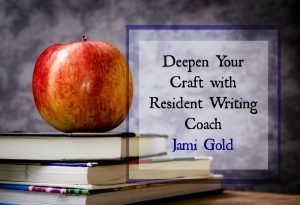
Context is often an underappreciated element of our writing because when not done well, a context-filled passage can become a tell-not-show info dump. However, context is essential for most aspects of writing, from attributing dialogue and establishing stakes to evoking emotions and anchoring readers within a setting.
For that last situation, without context to ���set the scene,��� readers can struggle to visualize and fully immerse themselves in our stories. So let���s dig into this idea: How can we set the scene throughout our story and avoid common problems?
What Is the ���Talking Head��� Problem?
For many writers, dialogue is the easiest story element to write. In fact, some first drafts include only dialogue, saving the step to layer in other elements: setting and description, action, internal thoughts, emotions, etc. for later drafts.
Without the context of those additional layers���especially those that ground characters (and readers) in the scene���dialogue is like an audio play, making the story follow a couple of talking heads floating in an empty space. To avoid that problem, writers often fall back on two techniques that don���t necessarily help our story:
One common quick fix allows us to attribute dialogue but doesn���t solve the talking-head problem���and creates a lot of empty, clich��d phrases:She nodded.He smiled.She frowned.Another common fix addresses the talking-head issue but can also result in overwriting with too many details that don���t add to our story:She slid her finger around the rim of her coffee cup and then picked up the mug from the table.He sat back on his chair and crossed his ankle over his other knee.She shifted her weight and leaned against the wall.What���s a better solution? Include details that set the scene���fixing the talking-head problem���and that add meaning to our story.
How Can We Make Context Meaningful?Sure, we could avoid the talking-head issue by simply choosing random ways for our characters to interact with their environment: touching, pushing, pulling, opening, closing, eating, drinking, etc. But those random, empty interactions will drag down our story���s pace, feel contrived, and not add meaningful layers of context to our story. How can we ensure our contextual details are meaningful?
Details are meaningful when they add something to our story.Strong description provides context for…
a character���s emotional state and/or emotional strugglea character���s thought process and/or their prioritiesforeshadowing a future meaningful detailhighlighting an important setting detailexposing a point of conflictreinforcing stakes or motivationsetting up a future plot pointand so on.Start by thinking of a character���s environment from their emotional perspective: What���s their situation and how do they feel about it? What interactions can express that?
a chilled character cradling a warm beveragean upset character pounding a table with each argumenta nervous character hugging a pillow
Also think about what we want readers to understand from the story: Which details matter (or will matter) to the story? What interactions can highlight where we want readers��� attention?
a character fiddling with a necklace later revealed as importanta character dropping things that create later issuesa character leaving a door open to later cause a sceneWhat Do Meaningful Details Look Like?Those examples in the second common fix shared up top could work for grounding readers in the setting and scene of our story if they were meaningful details. For instance, let���s expand on the first example:
���Ma���am, do you know where your ex-husband is?���
Sally slid her finger around the rim of the coffee cup. Should she tell the cop Bob had just been here, drinking coffee from this very mug?
She picked up the cup from the table and dropped it into the sink, along with all the other dirty dishes that seemed to pile up whenever her too-tempting-for-his-own-good ex was in town. ���No, officer, I haven���t been in contact with him.���

Now those contextual setting details add layers and subtext to the dialogue. Her touching the rim could reflect her internal debate and/or attempt to ruin DNA evidence, etc. Her picking up the cup reveals her decision in the debate by preventing the cop from discovering the evidence, while the rest of the sentence hints at more of her internal conflict.
The actions that set the scene, giving readers a visual way to imagine the setting, now add meaning to the exchange. They���re not just random actions thrown in to tell readers these characters aren���t floating in empty space. There���s a reason for her actions that add layers to the storytelling.
Limit Reliance on the Quick & Easy ApproachAll that said, our story is likely to include some quick-and-easy ���she nodded��� or basic ���he sat on the couch��� type of sentences. The point is not that we shouldn���t ever use them in our writing, but that we shouldn���t rely on them too often, especially as we edit our story beyond the first draft.
Instead, when setting the scene and grounding our characters (and readers), we should look for actions and details that add layers of meaning to our story to strengthen and richen our storytelling. *smile* Do you have any questions or insights about how to set the scene in meaningful ways for our characters?
 Jami GoldResident Writing Coach
Jami GoldResident Writing Coach After muttering writing advice in tongues, Jami decided to put her talent for making up stuff to good use. Fueled by chocolate, she creates writing resources and writes award-winning paranormal romance stories where normal need not apply. Just ask her family���and zombie cat. Find out more about Jami here, hang out with her on social media, or visit her website and Goodreads profile.
Twitter �� Facebook �� Pinterest
The post Nods, Smiles, and Frowns: How Can We Avoid ���Talking Heads������and Cliches? appeared first on WRITERS HELPING WRITERS��.
June 5, 2021
7 Clues that Reveal Writing is Part of Your Life���s Purpose
I love today’s topic by Colleen M. Story, because it’s one that I think most writers think about…is storytelling our destiny? After all, writing isn’t easy and there’s a big learning curve. It’s easy to doubt ourselves and whether we’re up to the challenge. (But we are!) So read on for Colleen’s insight on how to KNOW the writing life is for you. ~ Angela
 It���s one thing to enjoy writing. It���s another to believe that writing is part of your life���s purpose.
It���s one thing to enjoy writing. It���s another to believe that writing is part of your life���s purpose.How can you tell which may be the case for you? Watch for the following seven clues.
1. You build your life around writing.You���re not someone who writes when they find the time. Instead, your writing is one of the top priorities in your life, and you make room for it. You create a daily schedule that leaves you 30-60 minutes or more to write. You block off time on the weekends to educate yourself via books, workshops, and writing groups. You find a way to budget for writer���s conferences, editing, and marketing assistance.
If your schedule gets out of hand and leaves you no time for writing, you change that schedule the first chance you get. The writing gets done, no matter what.
2. Your biggest reward from writing has nothing to do with money.
Sure, we all love big royalty checks, but that���s not why you write. Your biggest reward when it comes to writing is the surreal way you can escape into your make-believe worlds, the satisfaction you feel when you type ���the end,��� and the way your heart warms when a reader loves your characters.
You come back to writing again and again not because you hope for fame and fortune, but because the joy you find on the page is unlike anything else you���ve known, and you crave it. Writing is your addiction and you don���t have any plans to quit.
3. Writing helps you find meaning in life.When you look back on your life, you���ll think of your stories with a sense of pride. They represent the best of you, reflecting your greatest efforts and deepest thoughts.
When all the concerns and worries of life fade away, the time you spent writing will seem worthwhile because of the resulting stories you can share with others. Writing helps you feel like you did more than just exist while you were here���you created something valuable, something that can endure even after you���re gone, and that brings you peace.
4. Writing makes life a little easier for you.
Writing itself can be hard, and book marketing is certainly difficult for most, but on the whole, you find that writing makes life easier. As long as you know you���re continuing to progress with your writing projects, you can better manage that stressful job or frustrating colleague. Life’s little irritations are much easier to bear because you know that in the end, writing is waiting for you.
With writing, your goals are clear in your mind. You don���t have to struggle to figure out where you want to go next because you already know. There���s a clear road between you and your destination, and you���re eager to follow it.
5. Writing helps you get through the hard times.It���s not always easy to write through a crisis, as we all found out during the COVID-19 pandemic. Writing can help you wade through your feelings after the fact, though, and can give you a much-needed escape when the world gets a little crazy.
You enjoy sinking into your make-believe world where you can allow your characters to triumph and justice to reign. You like that in your stories, you can play God and make things turn out the way you think they should. You find it refreshing that when all else fails, your writing is there, no matter what. After an hour of writing, you can face the real world again.
6. Writing regularly brings you new opportunities.Your writing has opened doors for you. It���s helped you connect with other people you would have never known otherwise. It���s brought you new opportunities to expand your skills and develop your talents, allowing you more choices when it comes to developing your creative career.

Writing has helped you discover strengths you didn’t know you had and led you to feel more confident in your ability to create works of value. It���s encouraged you to step out of your comfort zone and learn new things, and that has helped you see even more ways to contribute.
Overall, when you look back over your life, you can see how much writing has helped you grow both professionally and personally, and you can envision how it will continue to do so in the future.
7. Without writing, life seems less���Most people wouldn���t miss a beat if they weren���t writing. For you, it���s different. Without writing, life would lose some of its depth, and maybe a lot of its magic. Your days would feel less fulfilling, and perhaps more hum-drum. You���d feel restless and like something was missing, and find your attention wandering more than usual.
Writing allows you to find more in life, more in your experiences and emotions, and more in the events you see unfolding around you. It allows you to mine everyday experiences for their deeper meanings, and to pay homage to the little things that upon reflection, mean so much. With writing, life opens up its secret passageways and allows you a glimpse into the mysteries that endure. With writing, life is so much more.
Note: For more on overcoming self-doubt and deciding to be a writer no matter what, see Colleen���s new book, Your Writing Matters: How to Banish Self-Doubt, Trust Yourself, and Go the Distance. Get your free chapter here!
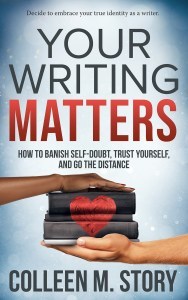
In her new release, Your Writing Matters, Colleen M. Story helps writers determine whether writing is part of their life���s purpose. Her book on author platforms, Writer Get Noticed!, was a gold-medal winner in the Reader���s Favorite Book Awards, and Overwhelmed Writer Rescue was named Book by Book Publicity���s Best Writing/Publishing Book in 2018. Her novel, Loreena���s Gift, was a Foreword Reviews’ INDIES Book of the Year Awards winner, among others.
Colleen frequently serves as a workshop leader and motivational speaker, where she helps attendees remove mental and emotional blocks and tap into their unique creative powers. Find more at her author website and Writing and Wellness, and connect with her on Twitter and YouTube.
The post 7 Clues that Reveal Writing is Part of Your Life���s Purpose appeared first on WRITERS HELPING WRITERS��.
June 3, 2021
Building Your Writing Support Triangle, Part 1: Critique
As writers, it’s important to have a support system, and it’s just as important to enlist the right people to that inner circle. Jessica Conoley is sharing the first post in a three-part series on what this support system should look like and who it should include.
Every writer I know who has lasted in the publishing industry for more than five years has one thing in common: a support system that functions on multiple levels. Everything about this industry (querying agents, sending stories out on submission, the erratic way in which we get paid, etc.) tends to weed writers out and wear us down. But those of us with multi-level support are more likely to weather the storms of self-doubt.

There are three key types of support for writers:
Critique: People who offer feedback on your writing in exchange for your feedback on theirs.
Mentorship: People ahead of you in their career who inspire you.
Accountability: People who help keep you on track for your writing and career goals.
The key to emotional well-being and continued productivity is knowing which part of your support system to call on when. The crazy thing is, once you start looking, you can find support everywhere: from writers and non-writers, people you may never meet in real life, or authors who don���t even know you exist.
Over the next few weeks, we���re going to delve into all three sides of the triangle. But today’s deep dive starts with that moment when you can no longer be objective about your work. Even worse, you can���t figure out what the hell you’re writing in the first place, and, oops, you���re 50,000 words in, but, damn, that last sentence was fire!
You need a fresh set of eyes that are attached to someone else���s brain. I typically know I���ve hit this wall when I���m moving the same sentence to four different places in a MS, deleting it, reinserting it, and then adding a comma because surely that���s going to solve the problem. If you���re at the tinkering-with-no-progress point in a project, call in your Critique Support.
Critique Groups: To refine your writing, gather a small group of writers who exchange work according to preset rules and time frames. The group format lets you see a variety of reactions to your work and triangulate information to see what you need to fix. If four out of the five of members of the group say, ���I was confused and had no idea what happened in this scene,��� you know you have a serious problem. If two of the members get in a huge fight about which one of your characters is the worst���fantastic! You���ve written something that invoked passion in others. If one person hates something, well that���s interesting and helpful feedback, but maybe it���s more about their personal preference than your writing. The added bonus���a critique group will help you develop a thicker skin, which will come in real handy when those reviews start going up at Goodreads.

Critique Partners: A good critique partner is worth their weight in gold because they���re willing to read the same chapter again, and again, and again. This is the writer you swap work with on a regular basis and provide reciprocal critiques. It���s helpful to specify which type of critique you need, depending on the stage of your project.
Big picture edits to check for pacing problems, voice consistency, or other over-arcing issuesLine edits when you���re tightening, refining voice, clarifying action, working on visualization, etc. Copy edits to check for grammar, consistency, and formatting issues before you send out for potential publicationPositivity Passes when you need to hear what you���re doing well. This is often overlooked and highly under-rated. Ask for this type of feedback when you’re thinking things like My writing sucks and Why am I even doing this? A positivity pass provides some much-needed validation. And if your CP can find something nice to say about the work, you won���t have to throw the whole thing in the garbage.Beta Readers: Beta readers are as close to a reader shopping a bookstore as you can get. These are one-time readers who give initial impressions on how your story is coming across. The super fantastic thing: beta readers don���t have to be writers. They just have to be readers whose opinions you trust. More information on finding beta readers and critique partners can be found here.
If you���re asking someone to read a full manuscript, that���s a huge time commitment, so start by asking if they would read the first ten pages for you. If they���re into your story, then ask if they’d like to read the whole MS. If they���re not into the story, it gives them a graceful out. Again, look for overlapping places where multiple readers comment. This means you���re either doing something really right or really wrong.
Critique lets you see your work (more) objectively. It lets you know what your strengths as a writer are and points out places where you could spend a little more time revising. If you get your critiques and realize you are great at description but your dialogue could use work, consider holding yourself financially accountable and invest in a class to help refine your skills.
One thing to keep in mind: Critiques are other people���s opinions. It is your story, so disregard the feedback that is irrelevant to your vision. Incorporate and revise based on the feedback that hit home.
Critique support often turns into emotional support as well. Writing is a weird industry, and only another writer is going to understand the sting of a query rejection or why it takes four years for your book to get to print. That emotional support has kept me from walking away from this industry more than once, and it all started with swapping some pages.
***

Bio: Jessica Conoley connects story tellers and tells stories. She writes essays, creative non-fiction, flash fiction, and fantasy. Her coaching services demystify the business aspect of writing by drawing on her past experiences as president of a non-profit and managing editor of a literary magazine. In addition to developmental editorial services, she offers virtual workspaces and critique groups as a way to foster creative community for writers. Learn more at: https://jessicaconoley.com/ or on Twitter @jaconoley
Before you go…Have you checked out The Writer’s Blowout?You can get your mitts on some of the most popular writing, publishing, and marketing guides out there, including our own bestselling Emotional Wound Thesaurus…each for less that a buck.
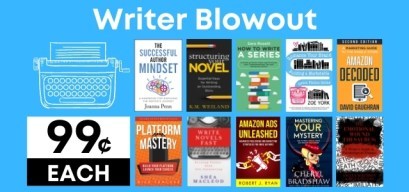
It’s an unbelievable price, right? But all of us in the Writers Blowout are all about getting your skills beefed up, so you move your writing career to the next level. Many of these books don’t go on sale like this, so do check them out.
This sale is only on until June 4th, so go forth and fill your toolbox! Happy writing!
The post Building Your Writing Support Triangle, Part 1: Critique appeared first on WRITERS HELPING WRITERS��.
June 1, 2021
Two Words that Will Supercharge Your Writing Career
Over the years I’ve gotten to know many writers and have noticed certain things about those who see their careers take off. No matter what their age, country of origin, or genre, they have a boatload of passion, tenacity, humility, and grit. But there’s something else as well, two words missing from their vocabulary: good enough.

What do I mean by that? Well, they don’t settle. Instead, they push themselves, studying their craft, attending workshops, and learning from experts so they can boost their craft and career.
I admire the heck out of them for it.
Because here’s the thing…when we write a story, we put hundreds upon hundreds of hours into it: thinking, planning, writing, reworking, rewriting, editing, revising, proofing, and rereading. Once it’s done, we make a choice–research & query, or research & self-publish–and dedicate more hours of work to see that choice through. Then finally, the magical day happens: the manuscript is a book! Of course, this means the next stage of work begins: getting our story into the hands of readers.
Hundreds of hours? For most it’s thousands.
After all that effort, is “good enough” really, you know, good enough?
Writing is a mountain of work, there’s no doubt. But successful authors don’t focus on the enormity of the task ahead. Instead, they start climbing.
And when they reach the plateau of “good enough,” they keep going.
Is it tempting to stop when a story’s in decent shape? Sure. If the quality is good enough, a person will sell some books. But if a writer keeps pushing and challenging themselves to do better, a greater level of success can be reached.
Successful writers don’t subscribe to the idea of good enough. They only know do better .
Do better when it comes to writing. Make this story even stronger than the last by putting in that extra effort.
Do better when it comes to being organized. They know with the right tools and help, they can streamline their process.
Do better when it comes to self-growth. There’s always more we can do to educate ourselves on writing craft, the industry, marketing, and our audience. The more we develop ourselves, the better we get at satisfying readers, adapting to change in our marketplace, and forming an agile and informed author’s mindset.
Confession: when I first started writing, “good enough” was my goal.I thought that once I was “good enough” I’d snag an agent and publishing deal, and then everything would be gravy. I’ve since learned that the good enough plateau just doesn’t cut it in such a competitive industry.

But something wonderful happened along the way to this epiphany: a love of the climb. I love to learn and see my skills improve. I enjoy the challenge and keep pushing myself to do better, and get a little further up the mountain.
One thing that can help someone embracing the do better mindset is to seek out experts who are a great source of information. Thankfully, our industry is filled with brilliant folks eager to share what they know.
And that’s why I want to draw your attention to something the incredible David Gaughran is hosting right now: the Writer’s Blowout.

This special sale contains some of the most popular guides for writers available, all listed at .99 cents each until June 5th. So if you need help with writing, publishing, or marketing, you can level up by learning from experts like Joanna Penn, David Gaughran, Nick Thacker, K.M. Weiland and many others.
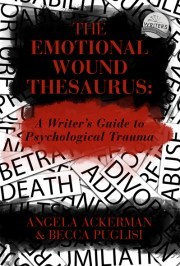
The Writer’s Blowout also includes The Emotional Wound Thesaurus: A Writer’s Guide to Psychological Trauma ebook, so if you don’t yet have it, you might want to pick up a copy.
A painful emotional wound is the centerpiece of most character arcs, so understanding how it will influence your character’s behaviors, goals, fears, and needs is key to crafting a powerful story.
The full range of books in this .99 cent sale can be found here.See you on the mountain!
The post Two Words that Will Supercharge Your Writing Career appeared first on WRITERS HELPING WRITERS��.
May 29, 2021
Relationship Thesaurus Entry: Principal and Teacher
Successful stories are driven by authentic and interesting characters, so it���s important to craft them carefully. But characters don���t usually exist in a vacuum; throughout the course of your story, they���ll live, work, play, and fight with other cast members. Some of those relationships are positive and supportive, pushing the protagonist to positive growth and helping them achieve their goals. Other relationships do exactly the opposite���derailing your character���s confidence and self-worth���or they cause friction and conflict that leads to fallout and disruption. Many relationships hover somewhere in the middle. A balanced story will require a mix of these dynamics.
The purpose of this thesaurus is to encourage you to explore the kinds of relationships that might be good for your story and figure out what each might look like. Think about what a character needs (good and bad), and build a network of connections for him or her that will challenge them, showcase their innermost qualities, and bind readers to their relationship trials and triumphs.
 Principal and Teacher
Principal and TeacherDescription:
A principal is the lead administrator at the primary, intermediate, and high school levels. As the boss, principals are responsible for evaluating a teacher’s work performance, as well as creating instructional policies and defining best educational practices within the environment. They may support a teacher through difficulties with students or parents, while also offering resources and development opportunities to strengthen their professional skills.
Relationship Dynamics
Below are a wide range of dynamics that may accompany this relationship. Use the ideas that suit your story and work best for your characters to bring about and/or resolve the necessary conflict.
A principal who respects the teacher���s professional judgment and gives them wide berth in carrying out instruction
A teacher who respects the leadership of the principal and follows their policies
A principal focused on the administrative side of things, leaving the education up to the teachers
A strictly professional relationship, where personal conversations and topics don���t come up
A micromanaging principal who does not respect the professional judgment of the teacher
A teacher who challenges the principals’ authority and decisions
A relationship with vastly different communication styles that lead to conflict
A cozier relationship���professional, but each person knowing and caring about the other���s personal life
A principal who expects more out of the teacher than they should
Challenges That Could Threaten The Status Quo
The principal abruptly or sharply changing school policies
A teacher receiving a poor evaluation (whether it’s warranted or not)
The principal playing favorites with other staff members
The teacher being overlooked for promotion or recognition
The two parties disagreeing on how to handle a difficult student or parents
One party needing to step away from professional duties to handle personal matters
One party engaging in an inappropriate relationship with another staff member or a student’s parent
The teacher needing critical supplies and being told that funds aren’t available
Having major differences in communication styles��
The principal controlling the teacher’s autonomy
The teacher being reassigned to a new class or grade level against their will
The principal focusing more on pleasing the parents than the staff
One party claiming credit for the idea or work of the other
The teacher questioning where tuition funds are applied
The principal compromising educational practices to boost tuition revenue
The teacher losing their position due to overstaffing or budget cuts
One party publicly admonishing the other
Wounds That Could Factor into The Relationship
A child dying on one���s watch, A learning disability, A school shooting, A sibling���s betrayal, A terrorist attack, A toxic relationship, An abuse of power, Battling a mental disorder, Being bullied, Being disappointed by a role model, Being disowned or shunned, Being falsely accused of a crime, Being fired or laid off, Being forced tBeing legitimately incarcerated for a crime, Being let down by a trusted organization or social system, Being the victim of a vicious rumor, Cracking under pressure, Crossing moral lines to survive, Failing at school, Failing to do the right thing, Having one’s ideas or work stolen, Infidelity, Losing a loved one due to a professional’s negligence, Making a very public mistake, Misplaced loyalty, Poor judgment leading to unintended consequences, Prejudice or discrimination, Social difficulties, Telling the truth but not being believed, Unrequited love
Conflicting Desires that Can Impair the Relationship
Each wanting control of educational practices
The principal wanting a particularly demanding student in the care of the teacher
The teacher not respecting professional boundaries and the principal’s role
The principal behaving in a way that makes the teacher uncomfortable
The teacher wanting to change positions��while the principal wants them to stay where they are
The teacher wanting more support than the principal can or will give
The principal assigning the teacher duties that he she doesn’t want to do or shouldn’t have to do
The teacher wanting a raise that the principal cannot or will not award
One party wanting a romantic relationship
Clashing Personality Trait Combinations
Cautious and Reckless, Efficient and Scatterbrained, Independent and Needy, Persuasive and Weak-Willed, Controlling and Rebellious, Dishonest and Honorable, Confrontational and Timid
Negative Outcomes of Friction
One party being fired or quitting
Negative energy impacting the students’ learning environment
One party receiving a poor performance because of bias or a history between the two characters
The teacher being bullied by someone who has control over their career
Uncomfortable interactions in group settings
The teacher experiencing diminished self-worth and burnout
Gossiping affecting morale and productivity among the faculty
One’s reputation being ruined
Decreased trust
Good ideas being rejected based on their source rather than their merit
Fictional��Scenarios That Could Turn These Characters into Allies
Coming together to implement an educational initiative or professional development
Teaming up to face a demanding or discriminatory parent
Coming together to support a child with unusual needs
Sharing a common experience in their personal lives
One party showing support for the other during a time of personal or professional difficulty
Planning a school/community event together (a festival, show, family night, etc.)
Planning a staff gathering together (a party, ceremony, etc.)
Experiencing a school-related trauma together (a shooting, a medical emergency, the terminal illness of a colleague, etc.)
Ways This Relationship May Lead to Positive Change
Respecting one another���s professional judgment and learning from each other
Forging a friendship beyond work
Self-reflecting after receiving a poor performance review, leading to growth
One of the parties learning to relinquish control����
Themes and Symbols��That Can Be Explored through This Relationship
A fall from grace, Alienation, A quest for knowledge, Betrayal, Borders, Crossroads, Depression, Disorder, Friendship, Greed, Inflexibility, Isolation, Journeys, Knowledge, Obstacles, Order, Perseverance, Pride, Rebellion, Recognition, Sacrifice, Stagnation, Suffering, Teamwork, Transformation, Unity
Other Relationship Thesaurus entries can be found here.
 Need More Descriptive Help?
Need More Descriptive Help?While this thesaurus is still being developed, the rest of our descriptive collection (15 unique thesauri and growing) is accessible through the One Stop for Writers THESAURUS database.
If you like, swing by and check out the video walkthrough, and then give our Free Trial a spin.
The post Relationship Thesaurus Entry: Principal and Teacher appeared first on WRITERS HELPING WRITERS��.
May 27, 2021
Phenomenal First Pages Contest
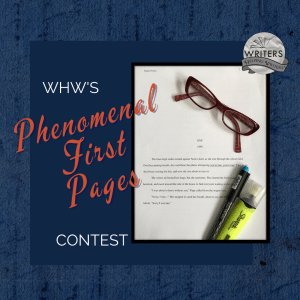 Hey, wonderful writerly people! It���s time for our monthly first-page critique contest
Hey, wonderful writerly people! It���s time for our monthly first-page critique contest 
If you���re working on a first page (in any genre except erotica) and would like some objective feedback, please leave a comment. Any comment :). As long as the email address associated with your WordPress account/comment profile is up-to-date, I���ll be able to contact you if your first page is chosen. Just please know that if I���m unable to get in touch with you through that address, you���ll have to forfeit your win.
Two caveats:
���� ��������Please be sure your first page is ready to go so I can critique it before next month���s contest��rolls around. If��it needs some work��and you won���t be able to get it to me right away, let me ask that you plan on entering��the next contest, once any necessary tweaking has been taken care of. Resources for common problems writers encounter in their opening pages can be found here.
��������Please be sure your first page is ready to go so I can critique it before next month���s contest��rolls around. If��it needs some work��and you won���t be able to get it to me right away, let me ask that you plan on entering��the next contest, once any necessary tweaking has been taken care of. Resources for common problems writers encounter in their opening pages can be found here.
���� ��������This contest only runs for 24 hours, start to finish, so get your comment in there!
��������This contest only runs for 24 hours, start to finish, so get your comment in there!
Three commenters��� names will be randomly drawn and posted tomorrow morning. If you win, you can email me your first page and I���ll offer my feedback.
We run this contest on a monthly basis, so if you���d like to be notified when the next opportunity comes around, consider subscribing to our blog (see the left-hand sidebar).
Best of luck!
The post Phenomenal First Pages Contest appeared first on WRITERS HELPING WRITERS��.
May 25, 2021
Does Your Character Have a Secret?
We all have secrets – you do and I do. And let’s face it, we work hard to not let them get out. But at the same time, when we get a whiff of another person’s secret, it sparks our curiously. We are natural information-gatherers and so usually want to know what it is.

Altruistically, we think maybe we can help, but we also know that if their struggle is one we have as well, sharing what we each know can benefit us both. There’s an empathy component, too. We know it can be hard to share a secret, especially if guilt or shame is involved, but letting it out provides a release because the burden of holding it no longer belongs to just one person.
At their heart, secrets hide insecurities and vulnerabilities, common ground to us all. None of us are experts at navigating everything life throws our way, after all. So even when the other’s internal challenges is something beyond our own experience, there’s comfort in knowing everyone struggles, not just us.
Clearly there’s lots of psychology embedded in secrets, and so we can (and should!) put this to work in our story to draw readers in.
Spark Curiosity
When something is hinted at in the story, readers sit up and pay attention. Partial information acts as a hook and they know something more is there. Curiosity triggered, they eagerly follow the clues a writer leaves until the shape of what’s being withheld is revealed.
In storytelling, secrets are addictive because they allow the reader to participate. They also act as a way to bring readers closer to a character because secrets shine a light on those inner vulnerabilities that people tend to hide. Readers understand the character’s reasons for holding back because they do the same. This shared behavior creates a bond where readers “get” the character in a meaningful way.
Pinpointing Your Character���s SecretHave you thought about what secrets your protagonist might be harboring, and the price that comes with bearing them? Secrets are rarely good things, especially in fiction. In fact, they can be a rat���s nest of pain because often they are kept out fear of exploitation or judgement and very often at the heart of one lies the character���s Emotional Wound.
Here are some types of secrets to help you decide what might be motivating your character to keep one.
Secrets Involving Guilt:There is a deep fear that, if a secret comes to light, one���s reputation and value among those one cares about will be diminished or even destroyed. Secrets that tie closely to guilt are ones where the character has done something that crosses moral lines. As author David Corbett states in The Art of Character, ���guilt is between you and your conscience.��� A few examples:
Infidelity (cheating on a spouse or lover)Theft or destruction of another���s propertyThrowing someone ���under the bus��� to obtain an advantage or avoid consequencesAggressive or bullying behaviors that forces someone into submission or acquiescenceLying or deceit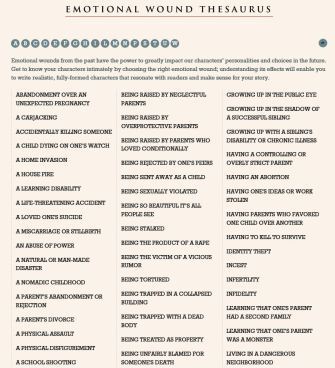
Think your secret is tied to an Emotional Wound? Visit this database of Emotional Wounds to see if it fits.
Secrets Involving Shame:When shame is involved, the worry that one���s secret will shatter the view others have about oneself is even more pronounced. Shame is not always logical or deserved. While it may be a result of an action or choice, it might also simply be the mistaken belief that one could or should have done something to avoid the eventual outcome. A few examples:
Failing to achieve a goal or objective which impacts other peopleFailing another in their time of needEvents that will cause humiliation if known (being forced to perform immoral acts during a college hazing, for example)Negative associations (being the child of a known serial killer; having past ties to a violent or disreputable organization, etc.)Past victimization, especially sexual in nature (a rape, for example)Many secrets have elements of both guilt and shame because it is human nature to internalize and personalize situations even when it is underserved or inaccurate to do so. A rape victim may keep her abuse a secret out of shame for what was done to her, and guilt at believing (wrongly so) that she was somehow partially to blame because of something she did or didn���t do.
Secrets Involving Exploitation:Some secrets are kept simply out of the worry that if found out, another might take advantage in some way. A few examples:
Having a special power or exceptional talent (psychic abilities, super strength, etc.)Being a Person of Interest (having fame or power due to one���s own success, or by association, such as being the daughter of a political figure or well-connected oil tycoon)Making a discovery (an invention, scientific breakthrough, a new technology or process that will revolutionize, etc.) which others will covet and likely try to appropriate Secrets out of Necessity:
Secrets out of Necessity:Many times a character keeps secrets because they feel they must, not so much for themselves, but to protect others. The reason may also tie into one of the above factors, saving someone unnecessary pain, guilt or exposure. A few examples:
Keeping the truth to oneself regarding an event because someone is too fragile to accept what happened, or bear personal responsibility if that is the case (and there is no reason to cause further pain)A family secret that is closely guarded for fear of exploitation or unfair persecutionA tradition, piece of knowledge or practice that is safeguarded for privacy, to avoid exploitation, or to keep the information from being misused/misinterpreted or corruptedKeeping a secret because it belongs to another, and it is not one���s place to reveal itBeing legally or ethically bound to keep a secret (like those kept between lawyers and clients, doctors and patients, a priest and parishioner, etc.)When planning a secret, consider these three questions:Does this secret enhance the plot line, or distract from it?Does this secret align with the character���s moral code?Does this secret send a message about the character���s personality that meshes with how I want readers to think about him or her?TIP: If you need more ideas for secrets, we’ve built a Character Secrets Generator at One Stop for Writers.
What���s your character���s big secret? Let me know in the comments.The post Does Your Character Have a Secret? appeared first on WRITERS HELPING WRITERS��.
May 22, 2021
Relationship Thesaurus Entry: Estranged Parent and Child
Successful stories are driven by authentic and interesting characters, so it���s important to craft them carefully. But characters don���t usually exist in a vacuum; throughout the course of your story, they���ll live, work, play, and fight with other cast members. Some of those relationships are positive and supportive, pushing the protagonist to positive growth and helping them achieve their goals. Other relationships do exactly the opposite���derailing your character���s confidence and self-worth���or they cause friction and conflict that leads to fallout and disruption. Many relationships hover somewhere in the middle. A balanced story will require a mix of these dynamics.
The purpose of this thesaurus is to encourage you to explore the kinds of relationships that might be good for your story and figure out what each might look like. Think about what a character needs (good and bad), and build a network of connections for him or her that will challenge them, showcase their innermost qualities, and bind readers to their relationship trials and triumphs.
 Estranged Parent and Child
Estranged Parent and ChildDescription:
An estrangement between a parent and a child occurs when there is an absence of communication between them. Certain factors can contribute to this situation. What led to the breakdown in communication? Was there a long-term pattern of abuse, or a specific painful incident? Was the choice one-sided or mutual? Was the estranged parent or child coerced by someone else into ending the relationship? The separation of a parent and child is often a devastating scenario, creating emotional wounds and resulting dysfunctional behaviors that will influence dynamics in the character’s other relationships.
Relationship Dynamics
Below are a wide range of dynamics that may accompany this relationship. Use the ideas that suit your story and work best for your characters to bring about and/or resolve the necessary conflict.
The characters avoiding gatherings where the other may be present
The characters attending family gatherings and events but pretending the other person isn’t there
One person reaching out, but the other party rebuffing any attempts to communicate
An estrangement defined by anger, rage, jealousy, or bitterness
A reluctant estrangement that occurred out of one party’s need to protect oneself or set healthy boundaries
Deleting messages without reading, listening, or responding to them
Asking other family members not to speak about the estranged party
Running the other party down to others in an attempt to get people on the character’s side
Publicly attacking the other party
Blaming the other person entirely, believing they are solely to blame for the estrangement
Refusing to listen to anyone suggesting reconciliation
Becoming paranoid about someone sharing information with the estranged party
Challenges That Could Threaten The Status Quo
The parent or child becoming ill
The death of a mutual loved one
Being approached about reconciliation by someone the character greatly respects
The parent or child experiencing a major life change, such as marriage or childbirth
Losing one���s financial stability and needing support
Needing to forgive as part of a faith-based culture, therapy program, or rehabilitative program
Another estranged sibling reconciling with the parent
One party deciding to seek forgiveness
Recognizing that the character shared in the blame for the estrangement, and needing to make amends
Seeing healthy, loving relationships and wanting that for oneself
Learning information that discredits the reasons for the estrangement
Wounds That Could Factor into The Relationship
A loved one’s suicide, A parent’s divorce, A parent’s abandonment or rejection, A sibling’s betrayal, A toxic relationship, Abandonment over an unexpected pregnancy, Battling a mental disorder, Becoming a caregiver at an early age, Becoming homeless for reasons out of one’s control, Being disappointed by a role model, Being disowned or shunned, Being forced to keep a dark secret, Being forced to leave one’s homeland, Being raised by a narcissist, Being raised by an addict, Being raised by neglectful parents, Being raised by overprotective parents, Being raised by parents who loved conditionally, Being sent away as a child, Being the product of a rape, Choosing to not be involved in a child’s life, Discovering a sibling’s abuse, Domestic abuse, Experiencing poverty, Experiencing the death of a parent as a child or youth, Finding out one was adopted, Giving a child up for adoption, Growing up in a cult, Growing up in foster care, Growing up with a sibling’s disability or chronic illness, Having a controlling or overly strict parent, Having an abortion, Having parents who favored one child over another, Incest, Infidelity, Learning that one’s parent had a second family, Learning that one’s parent was a monster, Living in an emotionally repressed household, Not being a priority growing up, Prejudice or discrimination, Social difficulties, Telling the truth but not being believed, The death of one’s child
Conflicting Desires that Can Impair the Relationship
One party seeking reconciliation before the other is ready
Both parties wanting to participate in family gatherings without the other present
One party forcing their belief system on the other party
One party wanting to reveal the truth while the other wants it to remain hidden
A parent wanting access to a grandchild
A child wanting access to the parent they are not estranged from
Both parties having different opinions about their emotional needs
One party wanting forgiveness before the other is ready to extend it
One party offering reconciliation with strings attached
Clashing Personality Trait Combinations
Discreet and Gossipy, Independent and Needy, Controlling and Rebellious, Judgmental and Oversensitive, Responsible and Uncooperative, Dishonest and Honorable, Trusting and Manipulative, Mature and Irresponsible, Nurturing and Withdrawn, Ambitious and Lazy
Negative Outcomes of Friction
Arguments or fights
Having limited access to other family members
Being left out of gatherings with loved ones
Self-blame for not handling the situation better, resulting in self-doubt
Feeling powerless (to control behavior, to influence the other person, etc.)
Reluctance to trust in other relationships
Friction with other family members who have taken sides
One side trying to hurt the other
Growing resentment, frustration, or anger toward the other
Passing anger and hate to one’s children, creating generational dysfunction
Experiencing an emergency and not having a support system to offer help
Being too quick to end challenging relationships instead of trying to solve problems in a healthy manner
Fictional Scenarios That Could Turn These Characters into Allies
Discovering something in common that brings the two together
Both parties realizing that the reason for their estrangement was manufactured by others (they were manipulated)
One party divorcing the person who served as a wedge between the two
Teaming up to care for another family member
One party being acquitted of the accusations that led to the split
A major life event such as illness, death, or birth bringing the two parties together
Showing a unified front when the family is targeted by others
A goal that will benefit both parties, such as handling a family business or the estate of a loved one
Needing to keep an important secret
A financial difficulty that could be solved by repairing the relationship
Ways This Relationship May Lead to Positive Change
One of the parties recognizing the importance of family
An adult learning not to repeat a negative pattern of behavior
One of the two parties realizing they need to seek or extend forgiveness
An emotional need being filled in another, healthier relationship
The character recognizing signs of toxicity and being able to avoid it more easily in future relationships
The characters’ ability to forgive and take responsibility being the catalyst for reconciliation in other family spats
Themes and Symbols That Can Be Explored through This Relationship
A fall from grace, Alienation, A quest for knowledge, Betrayal, Coming of age, Crossroads, Danger, Death, Deception, Depression, Disorder, Endings, Family, Freedom, Greed, Health, Hope, Illness, Instability, Isolation, Journeys, Knowledge, Loss, Love, Mystery, Obstacles, Passage of time, Peace, Pride, Rebellion, Recognition, Religion, Suffering, Transformation, Unity, Violence, Vulnerability
Other Relationship Thesaurus entries can be found here.
 Need More Descriptive Help?
Need More Descriptive Help?While this thesaurus is still being developed, the rest of our descriptive collection (15 unique thesauri and growing) is accessible through the One Stop for Writers THESAURUS database.
If you like, swing by and check out the video walkthrough, and then give our Free Trial a spin.
The post Relationship Thesaurus Entry: Estranged Parent and Child appeared first on WRITERS HELPING WRITERS��.
Writers Helping Writers
- Angela Ackerman's profile
- 1014 followers



